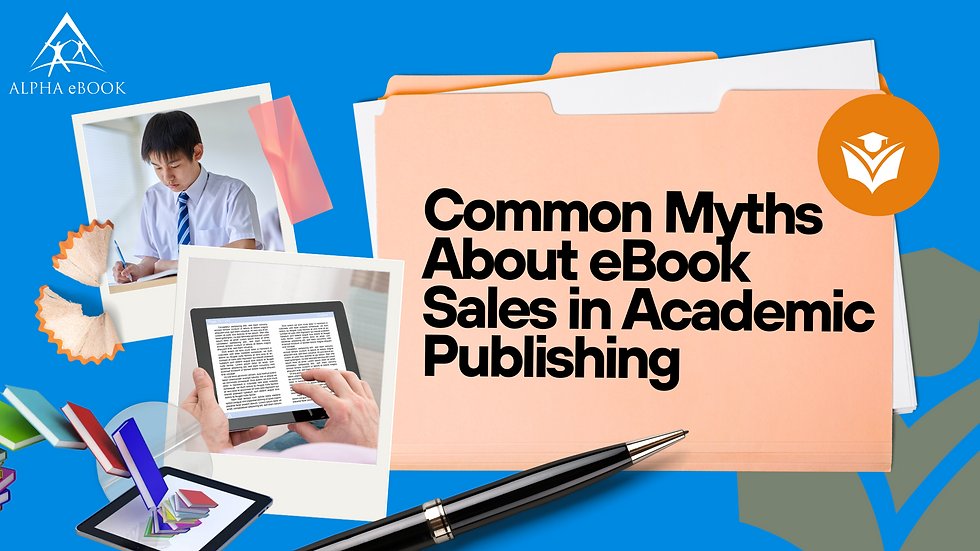Benefits Of an eBook: Why Do Authors Need One?
- Alpha eBook

- Jun 27, 2024
- 4 min read

Amidst the ever-evolving literature landscape, the question of whether an e-book is essential for authors echoes loudly. In this digital age, where technology dictates how we consume content, the e-book has emerged as a formidable contender in the publishing world. But what significance does this hold for authors? Join us on a quest to unravel the mysteries of the digital domain.
We'll explore the advantages, surprises, and everything involved in embracing the e-book format, including the best e-book conversion services. Whether you're a seasoned author seeking to adapt to modern publishing trends or a fresh-faced writer eager to explore new routes, this journey promises insights. In this blog, we'll equip you with the knowledge to determine whether an e-book is a must-have in your literary arsenal.
The Rising Tide of E-books
E-book sales are increasing every year. Between 2010 and 2020, e-book revenue in the UK shot up by 18.9 percent. With access to physical bookstores being limited lately, we might see even more people turning to e-books.
Almost everyone has some kind of electronic device, like a tablet or a phone. This makes e-books super easy to get. They offer another way for readers to enjoy their favorite stories. They're perfect for holidays when you want to avoid lugging around heavy printed books. Download your e-books onto your device, and you're ready!
One big plus of e-books is that they're usually more affordable than printed books, making them a budget-friendly option. This makes them great for people on a tight budget. Suppose you put your book on a platform like KDP (Kindle Direct Publishing), in that case, you can even participate in special deals and ads on Amazon. This helps get your book out to even more readers, widening your reach. Considering professional e-book services can further enhance the quality and reach of your e-book, ensuring it reaches the widest audience possible without breaking the bank.
Harnessing the Power of Print and Digital
You don't have to choose between print or digital. Embracing both can boost your book's visibility and respect the diverse preferences of your readers. Ever noticed how all popular books come in both formats? Following their lead can help you look like a pro author and cater to a wider audience.
E-book readers are a big audience you want to take advantage of. A study by the Pew Research Center found that some people read only e-books, while many others read both print and e-books. These stats can make a difference in your book's success!
Having your book in both formats can also help with internet searches. Readers might find your website through an e-book file and then decide to get a printed copy. This makes your website a one-stop shop for your readers.
Benefits of Having an E-book
Here are some very common benefits of having an ebook
Easy Updates
One of the best things about e-books is that they can be updated anytime. Since e-books are usually stored in the cloud, authors and publishers can quickly add the latest information. This means readers always have access to the most current content. Plus, it saves on the costs and hassle of reprinting.
Beyond Amazon
Avid e-book readers don't have to stick to Amazon or Barnes & Noble. There are plenty of places to read for free. Project Gutenberg offers 70,000 free downloadable books, mostly classics, now in the public domain. Free Classic Books lists books from authors like Louisa M. Alcott to P.G. Wodehouse. Google Books also boasts over 10 million free downloadable books, including textbooks, government documents, and literary classics.
Special Considerations: The Publishing Business
E-books cut out some traditional publishing costs but come with their expenses. Formatting an e-book for various devices can be costly. Online sellers like Amazon and Barnes & Noble take a percentage of e-book sales, usually between 30% and 50%.
The Independent Route
Independent authors and small publishers have more flexibility with pricing but still face many of the same costs. They must pay a percentage of sales to online distributors and often need to hire cover designers and formatters. Marketing and promotion are also crucial to get noticed.
Despite these costs, e-books are generally cheaper to produce and sell for less than print editions. Converting a print book to an e-book can alleviate some of these expenses, making it a more cost-effective option for authors.
The Best of Both Worlds
E-books offer a broad reach, with platforms like Project Gutenberg and Google Books providing free access to many titles. Libraries and apps like OverDrive also enhance accessibility.
Though e-books save on some traditional costs, they bring new expenses like formatting and digital rights management. Independent authors can navigate these challenges with creative marketing and direct reader engagement. Numerous resources and services are available for those looking to convert a book to an e-book or convert a physical book to an e-book.
By combining print and digital formats, authors can cater to diverse preferences and maximize their reach, merging the strengths of both traditional and modern publishing. Utilizing the best e-book conversion services ensures a smooth transition and a professional final product, helping authors effectively expand their audience.




Comments